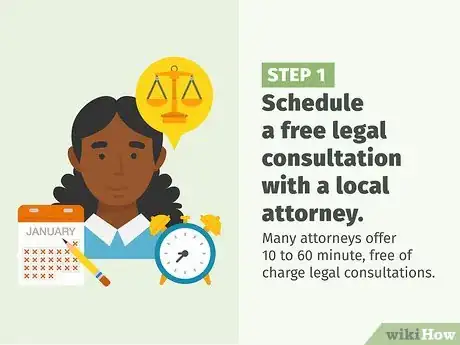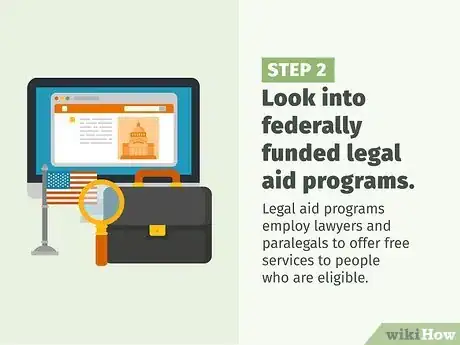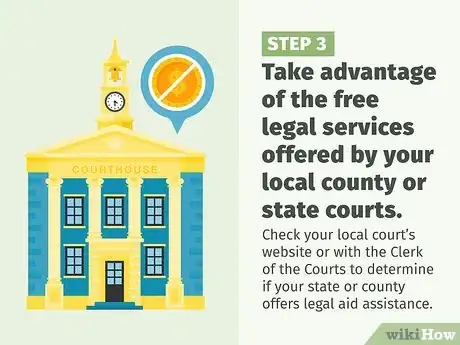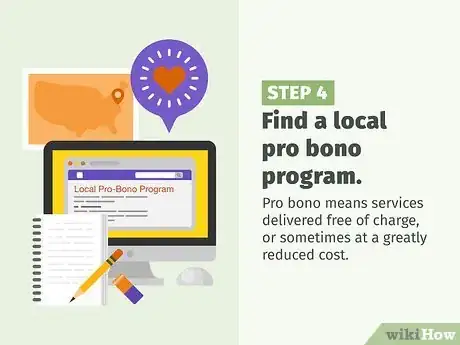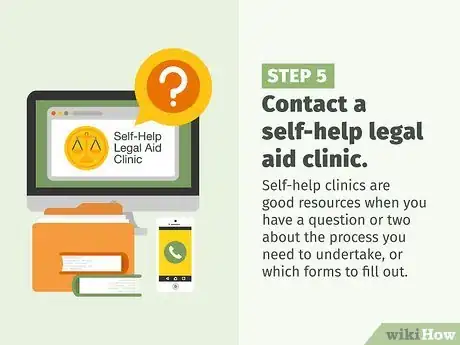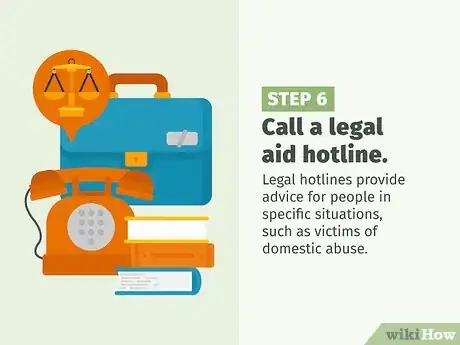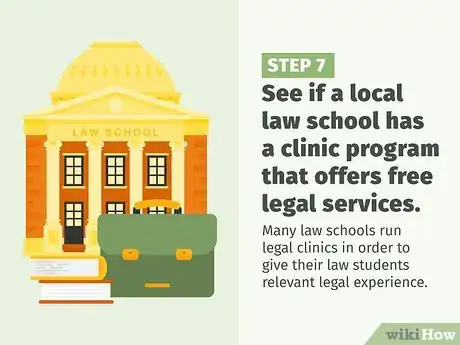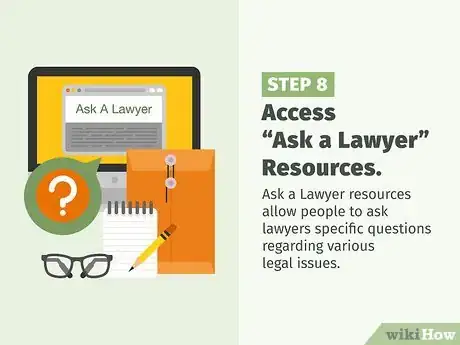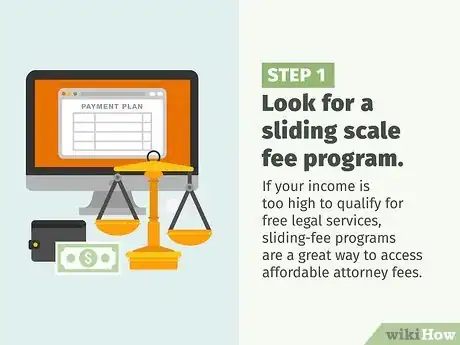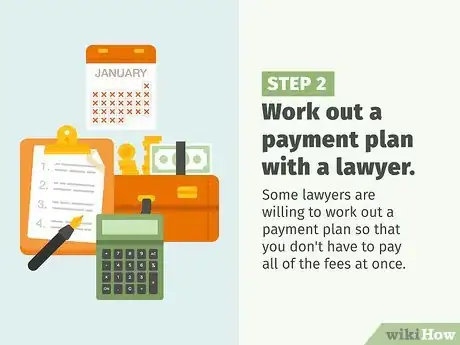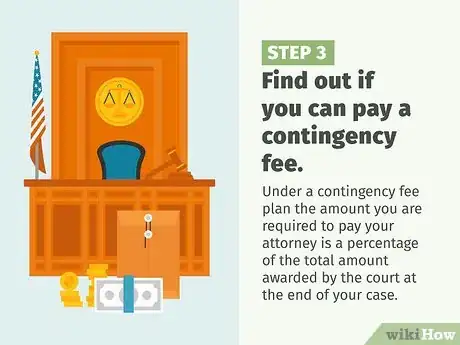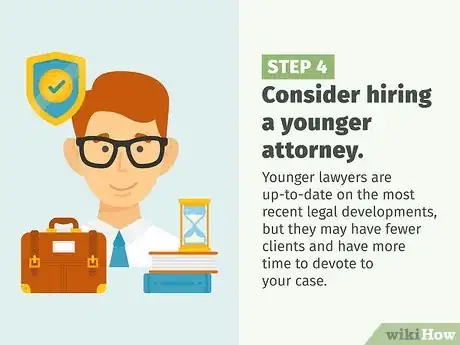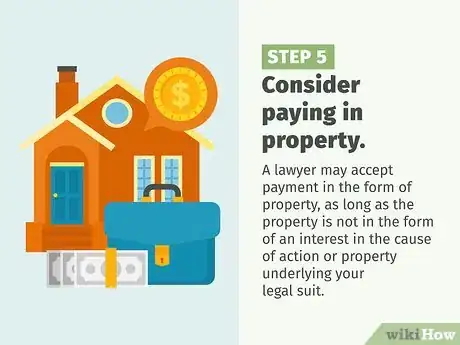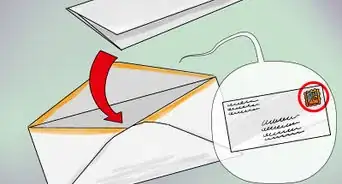This article was co-authored by Clinton M. Sandvick, JD, PhD. Clinton M. Sandvick worked as a civil litigator in California for over 7 years. He received his JD from the University of Wisconsin-Madison in 1998 and his PhD in American History from the University of Oregon in 2013.
This article has been viewed 110,522 times.
Stressed out about looming court proceedings or other legal issues? Aren’t sure how you’ll be able to pay for the legal representation that you deserve? Well don’t fret - there are a wide assortment of free legal resources available, as well as discounted legal service options you can access to receive the effective legal advice and representation that you need.
Steps
Accessing Free Legal Help Resources
-
1Schedule a free legal consultation with a local attorney. Many attorneys offer 10 to 60 minute, free of charge legal consultations. Check your phone book or online directory for attorneys in your area. Even if a law firm’s advertisement does not say “free consultation”,you should still call and inquire because most attorneys will give a potential client at least 10 minutes to talk without charge.
- Many bar associations have a referral service that will include a free consultation with an attorney. To find out if your local bar association has a program like this, visit the American Bar Association’s website. [1]
-
2Look into federally funded legal aid programs. Legal aid programs employ lawyers and paralegals to offer free services to people who are eligible.[2] Here in the U.S. there is a large network of legal aid programs that operate on federal grants.
- Legal aid programs are exceptionally helpful with providing legal advice for divorce proceedings, employment issues, landlord and tenant issues, and a number of other legal problems.
- In many states, your income must be below the federal poverty line in order to qualify for free legal aid. For information on the federal poverty line, click here
- To find a legal aid office, look online or look up "legal aid" in your area’s phone directory.
Advertisement -
3Take advantage of the free legal services offered by your local county or state courts. Many courts provide free legal clinics or Friend of the Court services to those involved in certain types of lawsuits, typically when family law related. Check your local court’s website or with the Clerk of the Courts to determine if your state or county offers legal aid assistance.
-
4Find a local pro bono program. Pro bono means services delivered free of charge, or sometimes at a greatly reduced cost. Local, state and federal bar associations, as well as non-profit organizations often conduct their pro bono programs. Before using any pro bono legal service, a party may have to prove his or her income is below a certain annual dollar amount by submitting pay stubs, bank account statement, and/or income tax returns.
- Research pro bono programs in your area by looking online or contacting a legal aid office to get a referral.[3]
- There are also nonprofits dedicated to providing pro bono legal help to those in need.
- Additionally, some private law firms have pro bono departments within their firms.These types of programs are usually geared towards specific issues that impact the community as a whole. To find a private firm who has a pro bono program in your area, simply search “private law firms + pro bono work” online.
- Bar associations often offer free legal assistance through pro bono programs. Lawyers willing to work for free, or "pro bono," are matched with people who qualify for free legal advice. Many local bar associations also offer programs that can reduce or eliminate legal fees or resources for how to find these programs. You can find a directory of pro bono legal services on many reputable websites including:
- The American Bar Association’s (“ABA”) webpage Consumer’s Guide to Legal Help.
- The United States Department of Justice’s Free Legal Services Providers page.
- The State Bar Associations United States Pro Bono Legal Services webpage.
-
5Contact a self-help legal aid clinic. Pro se litigants are those persons who appear in court and handle other legal issues without being officially represented by a licensed attorney. Many states and local communities offer designed to provide pro se litigants with help and advice for filling out and filing court documents.[4] Some clinics accept questions in person, while others accept questions submitted online. The questions are typically answered by lawyers or paralegals, and in many cases the process is confidential.
- Self-help clinics are good resources when you have a question or two about the process you need to undertake, or which forms to fill out. However, they are not a substitute for actually retaining a lawyer who can help with your case.
- To find a self-help program, call your local courthouse or look online. If you find a program that accepts questions in person, arrive as early as you can to ensure that you are helped.
- Most of the programs that accept questions in person are held at courthouses and handle specific legal issues, so make sure that you attend the right program to get the specific help you require.
-
6Call a legal aid hotline. Legal hotlines provide advice for people in specific situations, such as victims of domestic abuse. In some cases the advice is free, and in other cases services are offered at very low costs.
- Do a search for legal hotlines in your state, and find one that will give advice appropriate to your situation.
- It's important to call a hotline in your state of residence. The laws differ from state to state, so you might get the wrong advice if you call a hotline in another state.
-
7See if a local law school has a clinic program that offers free legal services. Many law schools run legal clinics in order to give their law students relevant legal experience. Clinics can take on all general civil or criminal matters, or may be geared towards one type of legal case, such as a foreclosure relief clinic or a domestic violence clinic.
- Legal help in the clinic setting is often offered by law students who are supervised by experienced law professors. While the law students themselves are not licensed attorneys, they are heavily supervised by experienced lawyers who will make sure that everything on your case is done correctly.
- Legal clinics often help people who have low income, but the specialized clinics will usually take good cases regardless of the individual’s income in order to give the students experience.
- To find a legal clinic, look on the websites of law schools in your area.
-
8Access “Ask a Lawyer” Resources. Ask a Lawyer resources allow people to ask lawyers specific questions regarding various legal issues. These resources connect people with experienced attorneys with specialized subject matter.
- Attend an Ask a Lawyer event. Many county and state bar associations, law firms, and legal aid organizations host regular Ask a Lawyer events where anyone can talk 1-on-1 with an attorney volunteer. To locate an Ask a Lawyer event in your area, search “YOUR COUNTY ask a lawyer” at your favorite search engine. For example, if you live in Madison County, Ohio, you would search “Madison County Ohio ask a lawyer”.
- Locate an Ask a Lawyer website. There are 1000’s of “Ask an Expert” sites, and most cannot be trusted to provide accurate and updated information. Therefore, you want to be sure that you choose a credible site if you intend to rely upon any advice you receive. Some credible and free Ask a Lawyer sites include:
- LawGuru. LawGuru is run by a group of attorneys and has been answering the public’s legal questions since 1997.
- Avvo.com. Avvo.com was founded in 1996 and since that time has gathered together a wonderful group of lawyers to answer your legal questions, free of charge.
- Free Advice. Free Advice was founded in 1991 and has been providing internet users with legal information and free legal advice for over a decade.
Finding a Lawyer for a Discounted or Special Rate
-
1Look for a sliding scale fee program. Sliding scale fee programs charge clients an amount that varies based on that person’s ability to pay as determined by income and family size. Under sliding scale programs those at the top of the set scale pay more in order to subsidize the services received by those at the bottom of the scale. Each state has a set of programs designed to help people with moderate income handle legal issues without having to pay thousands of dollars.
- If your income is too high to qualify for free legal services, sliding-fee programs are a great way to access affordable attorney fees.
- To find a program in your state, contact the state bar association or look online.
-
2Work out a payment plan with a lawyer. Some lawyers are willing to work out a payment plan so that you don't have to pay all of the fees at once. You may be able to work out a plan to pay a certain amount every month until everything you owe has been paid. However, it is important to remember that it is completely up to the individual lawyer to decide whether to make this option available.
- When you first contact you should ask whether the lawyer may be willing to accept a payment plan before scheduling an initial meeting. Explain your situation to the lawyer, give him or her your financial statement, and the legal services/assistance that you require.
-
3Find out if you can pay a contingency fee. Under a contingency fee plan the amount you are required to pay your attorney is a percentage of the total amount awarded by the court at the end of your case. This means that you only pay if you recover money in your case.[5] If the case is lost, you won't owe any legal fees, though you could still be responsible for expenses. It is important to note that in some cases, lawyers are not permitted to charge contingency fees.
- Most lawyers will take personal injury cases (injuries caused by careless drivers, property owners, or health-care providers) on contingency fee basis.
- Contingency fee arrangement percentages vary, but 30% to 40% of the total award is a common arrangement.
-
4Consider hiring a younger attorney. Younger lawyers are up-to-date on the most recent legal developments, but they may have fewer clients and have more time to devote to your case. A younger lawyer may even decide to charge less than the market average because they are not as experienced as other lawyers, and may have fewer resources to handle big cases.
- Ask your young lawyer how much experience he or she has with handling cases like yours.
- Also, ask if he or she participated in a clinic, internship, or a volunteer lawyer project while in law school.
-
5Consider paying in property. A lawyer may accept payment in the form of property, as long as the property is not in the form of an interest in the cause of action or property underlying your legal suit.
- Therefore, if you have physical property, such as land, that you would be willing to trade for a legal service, a lawyer may accept the land as payment so long as the land is not a part of the underlying litigation.
- Additionally, you can offer the attorney free services from a business that you own, or even a stake in the business, so long as the business does not have anything to do with the litigation that you need help with.
Warnings
- When you are negotiating a fee with an attorney, make sure you understand everything that you are agreeing to, and don’t be afraid to ask questions or asking to take some time think about the arrangement before officially retaining an attorney.⧼thumbs_response⧽
- An attorney should never promise you that they can achieve a specific result in your case, or that the result could change depending on the amount you pay. There is no way for an attorney to predict exactly how your claim will turn out. Therefore, it is unethical for an attorney to promise you that your case will have a specific result if you hire him or her.⧼thumbs_response⧽
- Regardless of what you agree to pay, if an attorney accepts you as a client they are required to fully and competently represent you, regardless of what you pay. If an attorney tells you that your case would have a greater chance of success if you pay them more, do not retain this attorney’s services.⧼thumbs_response⧽
References
- ↑ https://www.americanbar.org/groups/legal_services/flh-home/
- ↑ http://research.lawyers.com/When-You-Cant-Afford-a-Lawyer.html
- ↑ http://www.probono.net/
- ↑ http://www.in.gov/judiciary/selfservice/ free self-help clinics
- ↑ http://hirealawyer.findlaw.com/attorney-fees-and-agreements/types-of-legal-fees.html#sthash.b0bmeYRG.dpuf
About This Article
If you’re in need of free legal advice, start by visiting “Ask a Lawyer” websites such as LawGuru.com or Avvo.com to connect with experienced attorneys. You can also look online for a legal aid hotline in your state, but be aware that they may charge a low cost fee for certain services. Alternatively, try looking for a pro bono attorney on the US Department of Justice’s “Free Legal Services Providers” webpage. However, keep in mind that you may need to prove that your income is below a certain level to qualify for free services. For more tips from our Legal reviewer, like how to get free legal advice from local law schools, read on!
